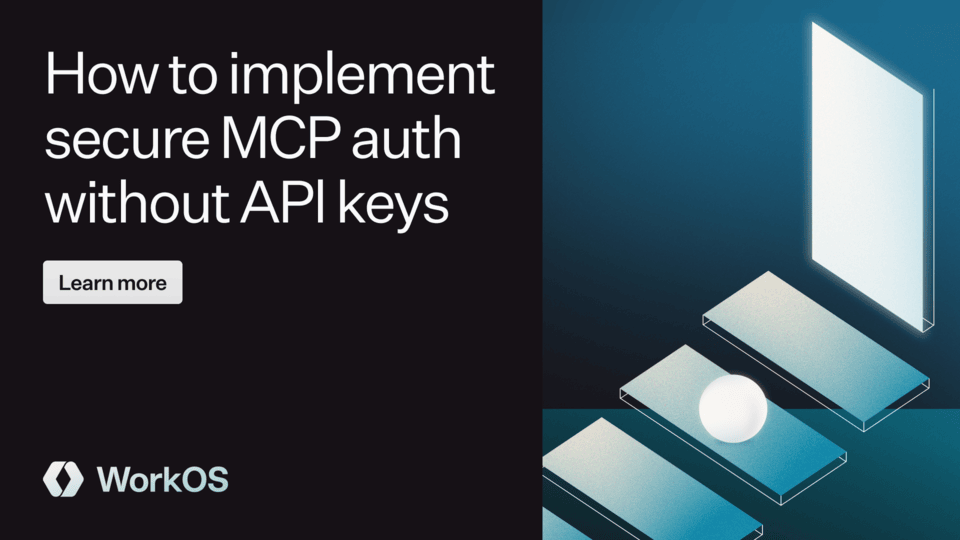Welcome, Developers! 👋
View transitions are going baseline across browsers, Meta transitions React to foundation governance, and companies are reshaping how developers work with AI tools. Plus insights on file-based routing and lessons from Figma's $100k Make-a-thon winners. | | |
| |
|

| How to implement secure MCP auth without API keys The MCP Registry makes it easy for LLMs to discover tools, but discovery alone isn’t enough.
Tools still need to act on behalf of users, and that requires secure, delegated access. API keys don’t cut it. They’re hard to scope, break user flows, and undermine the promise of seamless integration.
WorkOS Connect delivers a fully compliant OAuth 2.1 flow. It handles PKCE, scopes, user consent, and secure token issuance out of the box. |
| Ship secure MCP Auth | |
| |
🔖 The Reading Room
Articles we have hand-picked for you: | | |
What's new in View Transitions
View transitions allow polished entry/exit animations for modals and widgets without CSS and they're becoming baseline with Firefox's upcoming release. Same-document view transitions, view-transition-class, and auto-naming with match-element will work across Chrome, Edge, Firefox, and Safari. React has also moved view transition support into react@canary, signaling the design is nearly final for core integration.
By Bramus → | |
The Programmer Identity Crisis: On AI, Creativity, and Craft
Companies are forcing developers to use LLMs in specific ways, breaking the traditional autonomy programmers had in choosing their tools. This power shift reduces human collaboration, isolates team members, and transforms code reviews from collaboration into first-layer quality control of AI-generated content.
By Simon Højberg → | |
6 Winning Figma Makes And What You Can Learn From Them
Figma recently did a Make-a-thon where creators could submit creations from Figma Make to participate in a prize pool of $100k. This post goes through 6 of the winners with useful prompting tips. Figma Make is Figma's prompt-to-prototypes tool that tries to stick with design system consistency.
By Emma Webster → | |
Handling Routes in JavaScript Projects
File-based routing in modern JS frameworks creates maintenance nightmares without proper abstractions. Hard-coded route values lead to typos, refactoring headaches, and scaling issues. Start with a simple constants file to centralize route definitions and maintain your sanity as projects grow.
By Sean Davis → | |
The New Home for React & React Native
Meta announces the React Foundation under the Linux Foundation, bringing vendor-neutral governance to React and React Native. The new foundation includes representatives from major tech companies like Amazon, Microsoft, Vercel, and others. This marks React's transition from Meta-controlled to community-driven development after over a decade of growth.
By Meta → | | |
| |
| |
🔗 The Link Lounge Unordered finds from around the web: Find something cool? You can send us links to feature here via email. |
| | | | |
🧰 The Toolbox
Tools and products we're excited about today: | | | |
React Compiler v1.0
React Compiler v1.0 is finally here, it's a build-time tool that automatically optimizes React apps through memoization without requiring code rewrites. It analyzes components and hooks to reduce re-renders, improving performance by up to 12% in production while maintaining backwards compatibility with React 17+.
Learn more → | |
EmbedPDF
EmbedPDF is an open-source, framework-agnostic JavaScript PDF viewer that integrates with React, Vue, Svelte, Preact, or vanilla JS. It provides various PDF features alongside a tree-shakable architecture with clean developer API. Learn more → | |
ut
ut is a fast, lightweight CLI utility toolkit that consolidates common developer tools into a single binary. It provides encoding, hashing, data generation, text processing, development tools, and more. Learn more → | |
OpenZL OpenZL is a data compression framework that generates specialized compressors optimized for specific data formats, achieving high compression ratios while maintaining high speed.
Learn more → | | | |
How to implement secure MCP auth without API keys
The MCP Registry makes it easy for LLMs to discover tools, but discovery alone isn’t enough.
Tools still need to act on behalf of users, and that requires secure, delegated access. API keys don’t cut it. They’re hard to scope, break user flows, and undermine the promise of seamless integration.
WorkOS Connect delivers a fully compliant OAuth 2.1 flow. It handles PKCE, scopes, user consent, and secure token issuance out of the box.
The WorkOS advantage:
- Compliant with MCP OAuth 2.1
- Handles redirects, consent, and scopes
- Easy to drop in and fast to ship
Ship secure MCP Auth with WorkOS Connect | | |
| 🎤 Your Voice Your feedback shapes what comes next! We read every email, so simply hit reply and tell us what's on your mind. |
| | | | |
|
|